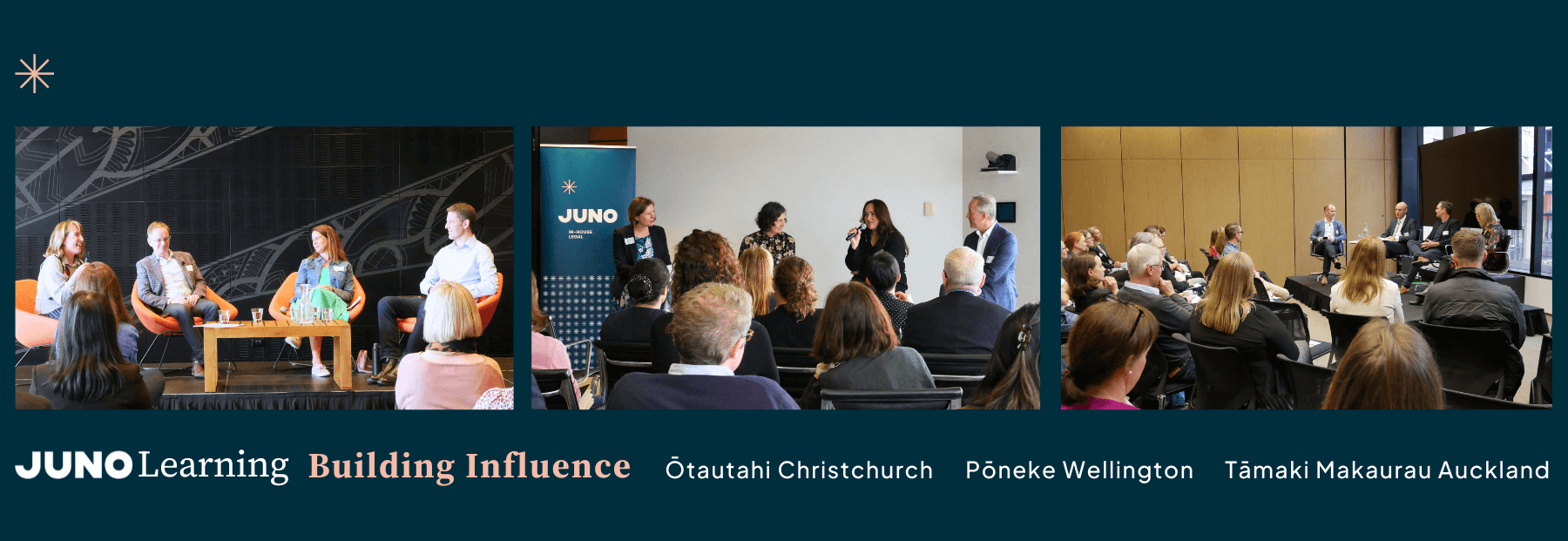Eager to explore this topic further, we gathered a troop of willing GCs, heads of legal and C-suite leaders (aka, those who need to influence and those who need to be influenced), asked them what they have seen work well and not so well. We took this subject on the road – hosting panel discussion events across Aotearoa and inviting in-house lawyers and heads of legal to explore it with us.
We can’t possibly recreate the warm, candid, and engaging conversations in writing, but we have summarised some key points and practical tips to inspire your thinking about your work, skills, and how you can leverage your influence for positive impact.
1. Defining Influence
One speaker defined influence as:
“Influence is the ability to shape outcomes, decisions, or behaviours of others without using force or authority. It's about guiding people towards a particular perspective or action through trust, respect, and connection.
True influence involves understanding what motivates others, building relationships, and communicating in a way that resonates with their values and needs. It's less about getting people to do what you want, and more about inspiring them to want to do it themselves.
Whether in leadership, negotiation, or everyday interactions, influence is fundamentally about connection and persuasion, often achieved through listening as much as speaking. It's a skill that empowers us to make an impact, drive change, and achieve shared goals in a collaborative manner.”
A recurring theme among our panelists was that the most effective influence is achieved by understanding others' motivations and communicating in alignment with their values and needs. This collaborative approach to influence isn't about having all the answers, but rather creating the right conditions for others to find their own.
In Māori culture, influence is deeply tied to mana—authority and respect earned through actions and integrity. It may also relate to whanaungatanga, the concept of relationships and connectedness. From this perspective, influence becomes something granted by others through demonstrated reliability and ethical behaviour rather than something asserted.
Practical tips:
- Listen more than you speak. Influence begins with understanding others' perspectives and finding common ground.
- Be proactive and curious. Don’t wait for influence to come to you, rather seek out opportunities to contribute beyond your immediate legal role.
2. Building Influence: The skills and competencies in-house lawyers need
The foundation of influence lies in skills that are associated with effective in-house lawyers:
- emotional intelligence,
- problem-solving skills,
- strong communication, and
- business acumen.
The most successful in-house lawyers are legal experts and trusted partners who understand the business and its strategic priorities – compared to external lawyers, this is the superpower of in-house lawyers.
Emotional intelligence—knowing when to speak and when to listen—was frequently emphasised in our discussions. Influence grows when you can tune into what truly matters to people. Building trust within the organisation means developing genuine curiosity about the business and asking questions that reveal your colleagues' priorities.
It's important to be aware that, as lawyers, we may be more comfortable with conflict than others. While this can be useful, it's essential to recognise when others may be less at ease. Having this emotional intelligence helps build rapport and maintain influence in a way that respects others' boundaries.
Practical tips:
- Be proactive and curious about your colleagues' challenges and goals, demonstrate how legal can be seen as problem solvers and opportunity creators.
- Build genuine relationships through empathy and trust, emphasising whanaungatanga.
- Be selective about where you try to influence, focusing on areas where your legal insights can make the most impact. Trying to weigh in on every decision can dilute your effectiveness.
- Focus on problem-solving, not just providing legal answers.
3. Maintaining influence: Adapting to changing environments
Influence isn't static—it shifts as organisations evolve. The importance of being "on the bridge of the battleship" was discussed as a metaphor for being strategically positioned to guide decision-making at the highest level. This positioning gives legal teams the visibility and insight needed to steer the organisation proactively.
When organisational structure doesn't allow legal a seat "on the bridge," positive influence is still possible by building connections, aligning advice with the company's direction, and offering clear, practical guidance. Legal's role extends beyond commercial success to include responsibilities like kaitiakitanga (guardianship), ensuring decisions support both business goals and the well-being of people and the planet.
Maintaining influence also requires adapting to new environments, including digital spaces. By staying engaged, sharing insights, and providing clarity in uncertain times, you help keep the organisation on course.
Practical tips:
- Maximise influence, regardless of your role's formal position, by building relationships and becoming a trusted advisor.
- Get involved in projects that highlight the value the legal perspective brings.
- Use data and stories strategically to tie your advice to both business goals and broader responsibilities.
- Let your work speak for itself by consistently delivering high-quality results.
- Offer balanced advice that addresses risks while highlighting opportunities for innovation and progress.
From being strategically positioned "on the bridge" to fostering strong relationships and balancing commercial goals with social responsibility, we’ve really enjoyed exploring and sharing what it means to build and maintain influence. We’re grateful to everyone who contributed, engaged, and joined us on this learning series of Building Influence.
Now, the challenge is over to you: choose one of these actions and take it forward in your own role. What's your next move?
